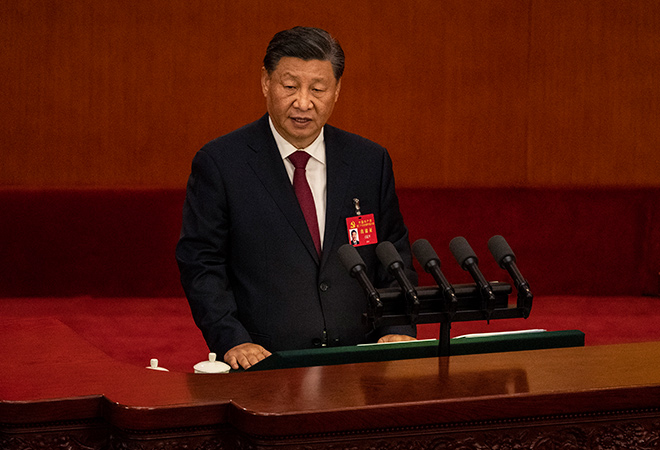-
CENTRES
Progammes & Centres
Location
Much has been retained when it comes to the roadmap for China’s diplomacy, while the additions reflect a growing concern for the current international geopolitical environment.

Chinese President Xi Jinping recently delivered a report to the 20th National Congress of the Communist Party of China (CPC). One of the highlights from the report was Xi’s thoughts on Chinese foreign policy/diplomacy. It was pointed out that over the past decade, China has “comprehensively promoted major-country diplomacy with Chinese characteristics, promoted the building of a community with a shared future for mankind, promoted the building of a new type of international relations, and actively participated in the reform and construction of the global governance system”. President Xi further stressed that, “China is dedicated to promoting global community with shared future,” and “ to pursuing an independent foreign policy of peace;” he also expressed his strong reservation against “all forms of hegemonism and power politics, the Cold War mentality, interference in other countries’ internal affairs, and double standards”.
To contextualise President Xi’s words, it is important to understand that in the CPC’s history, three factors have been considered important for formulating effective foreign policy: 1) accurately judging the international situation; 2) correctly handling the relationship between domestic affairs and foreign affairs; 3) “knowing oneself and the enemy”, i.e. to understand the limits in one’s own strengths and weaknesses and that of one’s adversaries.
In the Chinese assessment, the current international political and economic situation is “the most severe and turbulent since the end of the Second World War, 77 years ago.”
In the last few months, there has been rising concern in China regarding the turbulent international environment. In the Chinese assessment, the current international political and economic situation is “the most severe and turbulent since the end of the Second World War, 77 years ago.” It is argued that the world structure today is undergoing major flux, transformation and adjustment, with international balance of power witnessing a clear shift in China’s favour. As a result, this has become an era of endless challenges and increasing risks; of instability and uncertainty where Cold War mentality and bloc politics are resurgent; unilateralism and protectionism are on the rise; economic globalisation is facing adverse currents; and peace deficit, development deficit, trust deficit, and governance deficit are ever increasing.
Against this backdrop, there is a question gaining traction in China in recent months: Under “great changes unseen in a century, does the important strategic opportunity period for China’s development still exist?” On 24 June 2022, President Xi, at a high-level dialogue on global development, addressed this question to a certain extent, when he noted that, “China’s development is still in a period of important strategic opportunities, but both opportunities and challenges are witnessing new developments and changes.” Now, in this new era, what should China’s “major-country diplomacy with Chinese characteristics” look like? This can help the country achieve its second centenary goal—”building a modern socialist country that is prosperous, strong, democratic, culturally advanced, and harmonious by 2049”—and realise the great rejuvenation of the Chinese nation. This question is one of the critical issues that is being vigorously debated and discussed within the Chinese strategic circles.
However, the Global Development Initiative and the Global Security Initiative are the two new initiatives that have found their place for the first time in this year’s report.
In this regard, Chinese strategists noted certain constants and certain changes in Chinese diplomacy as highlighted by the report of the 20th Party Congress. China’s independent foreign policy of peace, the Five Principles of Peaceful Coexistence, the basic national policy of opening up to the outside world, and the attitude of participating in the reform and construction of the global governance system—these are the constants in Chinese diplomacy that have been declared on different international occasions and incorporated in this year’s report as well. However, the Global Development Initiative and the Global Security Initiative are the two new initiatives that have found their place for the first time in this year’s report.
Certain Chinese observers are also of the view that some of the major strategic judgments made/decisions taken by the leadership right before the Party Congress will mark the way forward for Chinese diplomacy in the coming years. These strategic decisions include President Xi Jinping personally attending the 22nd meeting of the Council of Heads of State of the Shanghai Cooperation Organisation (SCO) in Samarkand; his bilateral meetings with the leaders of the 10 countries attending the SCO Summit; attending the China-Russia-Mongolia tripartite meeting; conducting state visits to Kazakhstan and Uzbekistan; actively expounding on China’s Belt and Road Initiative, Global Security Initiatives and Global Development Initiatives; and signing a series of project agreements and cooperation documents with relevant countries. Also, more recently, this list also includes China’s active effort to get the International Atomic Energy agency (IAEA) to oppose the nuclear submarine deal between the United States, United Kingdom, and Australia, under the AUKUS partnership. These are being understood as landmark decisions taken by the CPC Central Committee to coordinate both domestic and international situations by offering new direction and creating a new situation for major-country diplomacy with Chinese characteristics. Also, as China strives to expand its “circle of friends” going forward, the Regional Comprehensive Economic Partnership Agreement, Comprehensive and Progressive Trans-Pacific Partnership Agreement and the Digital Economy Partnership Agreement seem to be at the top of the Chinese agenda.
The views expressed above belong to the author(s). ORF research and analyses now available on Telegram! Click here to access our curated content — blogs, longforms and interviews.